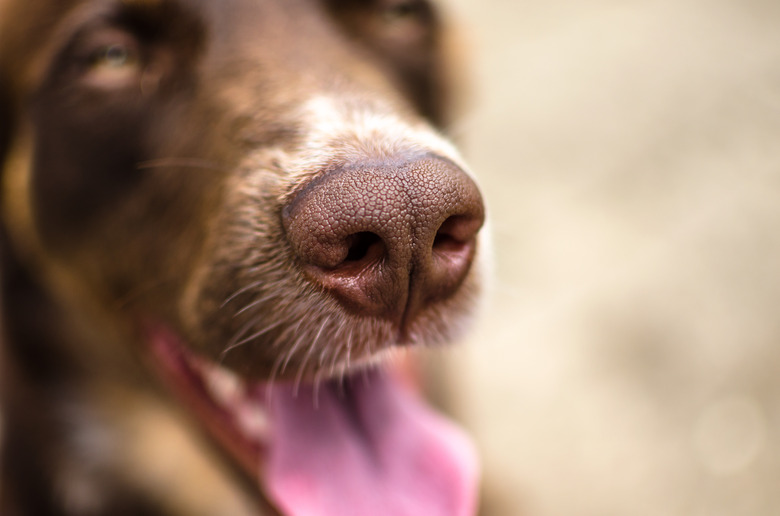My Dog Has Developed Black Spots On His Nose & Eyelids: What Causes This?
Many dogs sport light brown noses and light-colored eye rims. Some breeds are genetically predisposed to have a pink or mottled nose. As a dog of any breed ages, owners may notice black spots growing and changing on the animal's nose and eyelids. While your dog's new spots may not be symptomatic of any disease, two types of skin cancer can show up as black lesions on the face. You should seek a veterinary diagnosis to ensure your pet's continued health.
Hyperpigmentation in dogs
Hyperpigmentation in dogs
Hyperpigmentation, an increase in dark coloring of the skin, often causes black spots on dogs' skin — particularly the nose and tongue. Hyperpigmentation occurs naturally in some breeds, such as the Chinese Crested, as these hairless breeds produce extra melanin that protects their skin from the sun. Other breeds, including the chow chow and Shar-Pei, are often born with black spots on their tongues.
Typically, hyperpigmentation isn't cause for concern – especially if a dog was born with black dots on their skin. However, if your dog develops hyperpigmentation, it's best to make an appointment with your vet. Hyperpigmentation can occur as a result of UV exposure, skin allergies, or a medication side effect, so a change in a dog's skin color can sometimes be indicative of an underlying cause.
Melanoma in dogs
Melanoma in dogs
Melanoma, a form of skin cancer, typically presents as one or more dark-colored tumors on a dog's skin. While dogs with black fur may be predisposed to melanoma, this type of cancer is common in cocker spaniels, chow chows, and Golden retrievers, among others. Dogs with freckles are not any more likely to develop melanoma than other breeds, but skin growths can be harder to spot on freckled coats.
Canine melanoma occurs most often in the mouth and mucocutaneous junctions, parts of the body where hairless areas meet haired areas (such as the lips, anus, nose, and nailbed). Melanoma tumors can begin as pigmentation, such as a black dot on a dog's nose, and may become larger or raised. These tumors can be benign (non-cancerous) or malignant (cancerous) and can only be diagnosed by a vet.
Keep an eye out for any pigmentation changes on your dog's nose. Oral melanoma can affect the nose as well as the mouth, and oral tumors can often go undiscovered due to their location. Oral tumors can interfere with a dog's ability to chew, so watch for any signs that your dog is chewing differently or avoiding their food bowl. These tumors can also cause a dog's breath to become very foul — while normal dog breath doesn't smell great, a sudden change that smells overwhelmingly bad is a sign to get your dog in with their vet.
Squamous cell carcinoma in dogs
Squamous cell carcinoma in dogs
Squamous cell carcinoma, or SCC, is a tumor which affects the outermost layer of skin cells (called squamous cells). Squamous tumors can develop anywhere these cells are present and are often seen on the nail bed, paw pads, abdomen, back, ears, and nose.
SCC is variable in its appearance. It may present as a black spot on a dog's skin; irritated or red skin; or a dry, crusty plaque on the skin. This kind of tumor is usually found as a single lesion in one area, but there is a kind of SCC called multicentric squamous cell carcinoma (also known as Bowen's disease) that presents as two or more tumors on multiple areas of the body. Multicentric SCC is very rare in dogs.
If you notice any new growths on your dog's nose, mouth, or any other body part, it's best to schedule a vet appointment for them. SCC is a concern due to its tendency to metastasize, or spread to other parts of the body. Diagnosis may consist of taking a blood panel, biopsy, and/or fine needle aspiration of the growth for examination under a microscope. Depending on the diagnosis, your vet may recommend surgery to remove the tumor and prevent it metastasizing. Chemotherapy and radiation therapy are also options for treating SCC and should be discussed with your vet.

